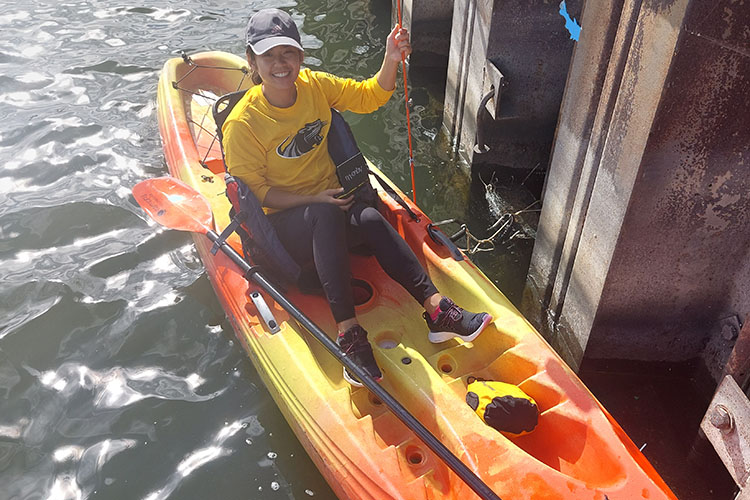Kayaking the Milwaukee River, researching aquatic plants and educating community members about the Habitat Hotels for fish in Milwaukee Harbor were just a few of the many activities Emma Gilbertson did during her internship with Harbor District Milwaukee.
“My favorite part was kayaking on the Milwaukee River for my research, leading public kayak tours and planning and participating in Harbor Fest!” says Gilbertson, who graduated from UW-Milwaukee in May 2022 with a master of freshwater science and technology. “My internship with Harbor District was a nice variety of science and outreach. They were a great organization to work with!”
Gilbertson was tasked with improving the 48 Habitat Hotels that Harbor District Milwaukee installed four years ago after shoreline dredging destroyed natural fish habitats. The manmade “hotels” are designed to encourage fish to return to the harbor. Many of the habitats needed repairs and updates such as installing aquatic plants that could better survive Midwestern winters.
Gilbertson monitored the habitats via kayak, collected underwater video footage of fish, and analyzed and reported information about the plant and fish health. She researched aquatic plants, installed new plants that may have a higher survival rate and updated monitoring procedures for the habitats.
What made her experience unique was that it combined science with community outreach. She helped with numerous Harbor District events, including running the DNR fish mobile, planning and leading activities at the annual Harbor Fest Celebration, leading public kayak tours of the Milwaukee River, and conducting outreach programs for middle school students.
“This internship provided many opportunities to strengthen leadership, organizational and communication skills during activities, such as teaching children to bait fishing hooks and cast reels, planning and coordinating with other community program leaders to arrange for food vendors and advertising, educating the public about environmental issues in the Milwaukee River and monitoring fish health during all day public events,” she says.
The internship was Gilberton’s capstone project for the Professional Science Master’s program, which requires graduate students to complete a minimum of 480 hours working with an organization of their choosing. The real-world skills help students land jobs after graduation.
“I have a job as a research assistant at the Great Lakes Research Facility doing work on microplastics and phosphorus cycling,” she says.
